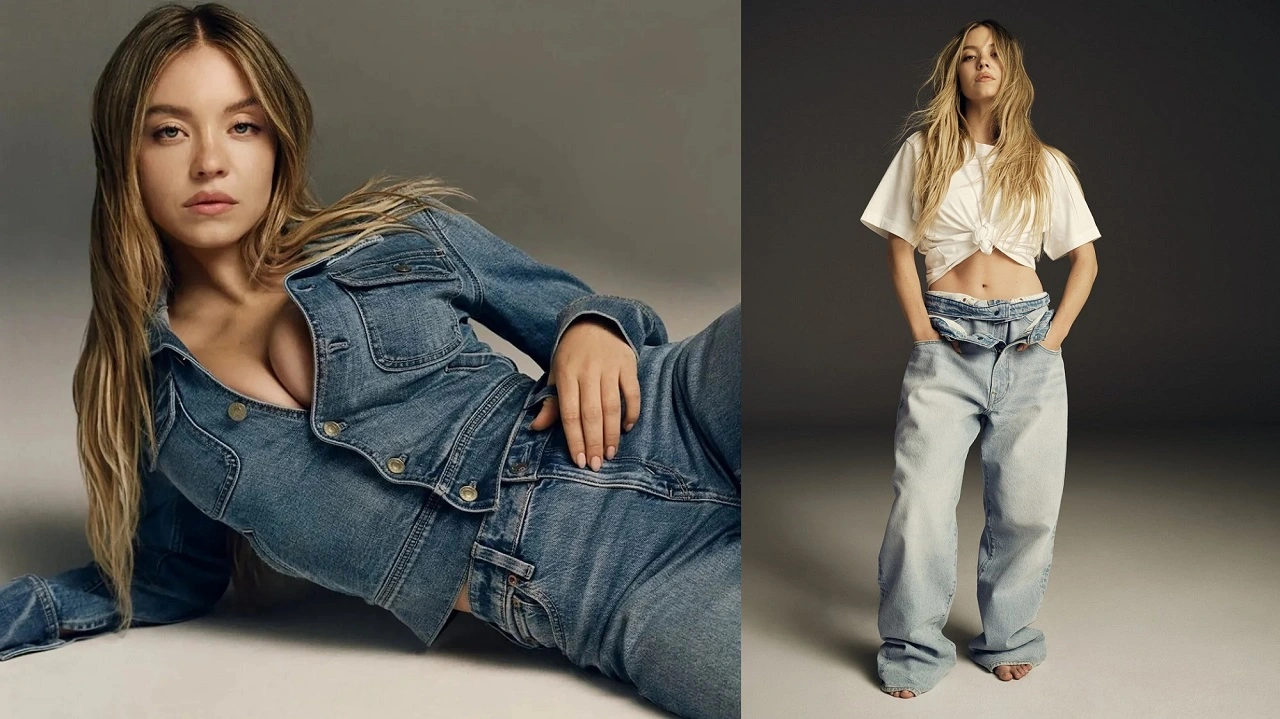A recent advertising campaign by American Eagle featuring actress Sydney Sweeney has sparked a firestorm of debate across social media and news outlets. Titled “Sydney Sweeney Has Great Jeans,” the campaign’s playful pun on “jeans” and “genes” has been criticized for allegedly promoting eugenics and reinforcing outdated beauty standards.
The backlash has led to discussions about potential lawsuits against American Eagle, while others argue the criticism is overblown. This article explores the ads, the public’s reaction, the calls for legal action, and the perspectives of those who oppose suing the company.
The American Eagle Campaign: What Are the Ads?
Launched on July 23, 2025, American Eagle’s fall denim campaign stars Sydney Sweeney, the 27-year-old actress known for her roles in Euphoria and The White Lotus. The campaign, titled “Sydney Sweeney Has Great Jeans,” centers on a wordplay between “jeans” (the clothing) and “genes” (genetic traits).
Several promotional videos and images feature Sweeney showcasing the brand’s denim line, with a focus on her blonde hair, blue eyes, and figure.
In one ad, Sweeney stands in front of a billboard that reads, “Sydney Sweeney Has Great Genes.” She crosses out “genes” and replaces it with “jeans,” emphasizing the pun.
Another video shows her reclining on a couch, saying, “Genes are passed down from parents to offspring, often determining traits like hair color, personality, and even eye color. My jeans are blue,” as the camera pans to her blue eyes.
A third ad includes a close-up of Sweeney’s chest as she quips, “Hey, eyes up here!” while buttoning her jeans. The campaign also promotes a limited-edition “Sydney Jean” with a butterfly motif, with proceeds supporting the Crisis Text Line for domestic violence awareness.
American Eagle intended the ads to be a fun, cheeky celebration of Sweeney’s appeal and their denim line. However, the wordplay and imagery sparked intense online scrutiny, particularly in the context of America’s polarized political climate.
Public Reaction: A Divided Response
The public’s response to the campaign has been deeply polarized, with social media platforms like X, TikTok, and Instagram serving as battlegrounds for debate. Critics argue that the ads, particularly the “genes” references, carry problematic undertones.
They point to Sweeney’s blonde hair and blue eyes—traits historically associated with Western beauty standards—as evoking eugenics, a discredited theory linked to racial superiority and selective breeding. Some users on X and TikTok called the ads “tone-deaf,” “Nazi propaganda,” and a “dog whistle” for white supremacy, especially given the current political push against diversity, equity, and inclusion (DEI) initiatives.
One TikTok creator, Jeff Kissubi, stated, “When eugenic theory started in America, it was saying that everything that was not centered around whiteness would make your gene pool bad.”
Others criticized the ads for sexualizing Sweeney, accusing them of catering to the “male gaze” with close-up shots and suggestive poses. A user on Instagram commented, “Are we selling jeans to women or selling women in jeans to men?” The backlash intensified when Sweeney’s voter registration as a Republican in Florida was revealed, fueling speculation that the campaign aligned with conservative values.
President Donald Trump’s endorsement of the ad, saying, “She’s a registered Republican? Oh, now I love her ad!” added a political layer, with some seeing it as proof of the campaign’s alignment with far-right ideologies.
On the other hand, many defended the campaign, dismissing the criticism as an overreaction. Supporters, including conservative figures like Vice President JD Vance and Senator Ted Cruz, argued that the ads are harmless and that the backlash reflects “cancel culture run amok.”
Vance, on the Ruthless podcast, mocked critics, saying, “My political advice to the Democrats is continue to tell everybody who thinks Sydney Sweeney is attractive is a Nazi.” On X, users praised American Eagle for rejecting “woke” advertising, with one post stating, “Thank goodness they chose a real woman, not some gender-confused activist. American Eagle just won the culture war.”
Some argued the ads are simply a clever marketing tactic, with one user commenting, “It’s literally an advertisement for jeans. Not for nazism.”
The campaign’s financial impact has been significant, with American Eagle’s stock rising 20-23% in the days following the launch, suggesting that the controversy has driven attention and sales.
Why Some Want to Sue American Eagle
The intensity of the backlash has led some critics to call for legal action against American Eagle, though no formal lawsuits have been reported as of August 6, 2025. The primary arguments for suing the company include:

-
Alleged Promotion of Harmful Ideologies: Critics argue that the “genes” wordplay, combined with Sweeney’s appearance, promotes eugenics or white supremacy, which they see as discriminatory and harmful. They claim the campaign’s messaging could violate advertising standards or consumer protection laws by perpetuating harmful stereotypes. Some point to the historical context of eugenics, which was used to justify racial discrimination, as grounds for claiming the ads are culturally insensitive.
-
Misleading or Offensive Advertising: Some believe the ads could be challenged under laws governing deceptive or offensive advertising. For example, the Federal Trade Commission (FTC) in the U.S. regulates advertising to ensure it is not misleading or harmful. Critics argue that the campaign’s subtext, intentional or not, could be seen as misleading by implying genetic superiority, potentially violating ethical advertising guidelines.
-
Cultural Insensitivity in a Polarized Climate: The ads’ timing, amidst debates over DEI and immigration policies, has led some to argue that American Eagle should be held accountable for failing to anticipate the backlash. Marketing expert Cheryl Overton noted, “The subtext isn’t imagined; it’s rooted in centuries-old narratives about one archetype of beauty that is seen as genetically superior.” Critics believe the company’s silence or failure to pull the ads entirely warrants legal scrutiny.
-
Impact on Vulnerable Communities: The campaign’s tie-in with domestic violence awareness has been called “tone-deaf” by some, who argue that linking a controversial ad to a sensitive cause could harm the nonprofit’s reputation or trivialize the issue. This has fueled calls for accountability, including potential lawsuits for reputational damage.
While these arguments have circulated online, no specific lawsuits have been filed, and legal experts suggest that proving harm or intent in court would be challenging without clear evidence of discriminatory practices.
Opinions Against Suing American Eagle
Not everyone believes suing American Eagle is justified. Several perspectives highlight why legal action over the ads may be unwarranted:
-
It’s Just a Pun: Many argue that the campaign’s wordplay is a harmless marketing tactic, not a deliberate endorsement of eugenics. American Eagle’s statement on Instagram emphasized, “‘Sydney Sweeney Has Great Jeans’ is and always was about the jeans. Her jeans. Her story.” Supporters, including Stephen Colbert on The Late Show, called the backlash an “overreaction,” noting that the ads are meant to sell denim, not promote harmful ideologies.
-
Lack of Legal Grounds: Legal experts suggest that suing over the ads would be difficult due to the lack of concrete evidence of harm or intent. Tara Goodwin, a crisis communications expert, stated, “The question is, was [the campaign] meant to offend? I think the answer to that is an unequivocal no.” Without proof of discriminatory intent or direct harm, a lawsuit would likely fail.
-
Freedom of Expression: Some defend the campaign as an exercise of free speech in advertising. They argue that brands should be allowed to take creative risks without facing legal repercussions for subjective interpretations. A user on X wrote, “It doesn’t hurt ANYONE. That’s the point. It’s literally an advertisement for jeans.”
-
Commercial Success Outweighs Backlash: Insiders cited by TMZ reported that 70% of respondents to independent polling had a positive reaction to the campaign, suggesting that the online outrage does not reflect the broader public’s view. The stock surge and increased sales indicate that the controversy has benefited American Eagle, reducing the incentive for legal accountability.
-
Focus on Real Issues: Some critics of the backlash argue that energy should be directed toward more pressing issues, like actual discriminatory policies, rather than a jeans ad. A TikTok user commented, “I personally don’t see why it’s causing all this controversy – to me, it’s just an ad for jeans.”
Broader Implications and Ongoing Debate
The Sydney Sweeney American Eagle controversy highlights the challenges brands face in navigating cultural sensitivities in a polarized society. Marketing experts have mixed views: Alan Adamson of Metaforce praised the campaign’s attention-grabbing nature, while Marcus Collins of the University of Michigan suggested including diverse models could have avoided the backlash.
The debate also underscores the role of social media in amplifying controversies, with platforms like X driving both criticism and defense.
Sweeney has not publicly addressed the controversy, though she made a subtle return to social media with an Instagram Story post on August 1, 2025, featuring flowers and a white heart emoji. American Eagle has stood by the campaign, doubling down on its message while removing some of the more criticized videos from social media.
In conclusion, the “Sydney Sweeney Has Great Jeans” campaign has sparked a complex debate about race, beauty standards, and marketing ethics. While some see grounds for legal action due to perceived cultural insensitivity, others view the ads as a harmless pun unfairly targeted by overzealous critics.
As the conversation continues, it serves as a reminder of the power of words and imagery in shaping public perception—and the fine line brands must walk in today’s cultural landscape.

Myself Aditya and I am from Mumbai, India. As an intern, I joined the local news agency in Mumbai named “The Mumbai News”. Now I am working with various News Agencies and I provide them reports from Mumbai and other parts of India.
















